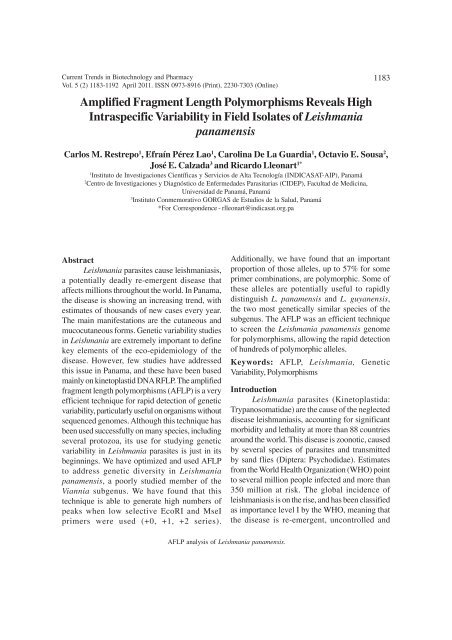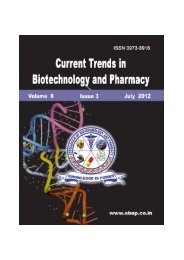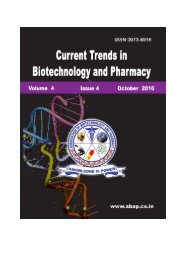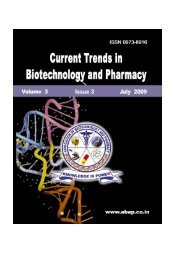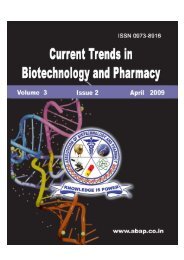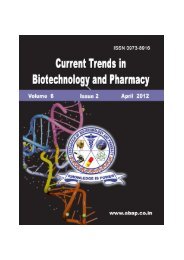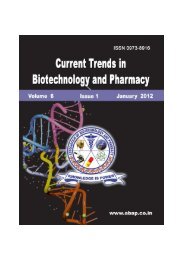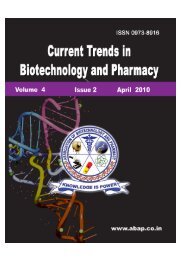Current Trends in <strong>Biotechnology</strong> <strong>and</strong> <strong>Pharmacy</strong>Vol. 5 (2) 1183-1192 April 2011. ISSN 0973-8916 (Print), 2230-7303 (Online)Amplified Fragment Length Polymorphisms Reveals HighIntraspecific Variability in Field Isolates <strong>of</strong> LeishmaniapanamensisCarlos M. Restrepo 1 , Efraín Pérez Lao 1 , Carolina De La Guardia 1 , Octavio E. Sousa 2 ,José E. Calzada 3 <strong>and</strong> Ricardo Lleonart 1*1Instituto de Investigaciones Científicas y Servicios de Alta Tecnología (INDICASAT-AIP), Panamá2Centro de Investigaciones y Diagnóstico de Enfermedades Parasitarias (CIDEP), Facultad de Medicina,Universidad de Panamá, Panamá3Instituto Conmemorativo GORGAS de Estudios de la Salud, Panamá*For Correspondence - rlleonart@indicasat.org.pa1183AbstractLeishmania parasites cause leishmaniasis,a potentially deadly re-emergent disease thataffects millions throughout the world. In Panama,the disease is showing an increasing trend, withestimates <strong>of</strong> thous<strong>and</strong>s <strong>of</strong> new cases every year.The main manifestations are the cutaneous <strong>and</strong>mucocutaneous forms. Genetic variability studiesin Leishmania are extremely important to definekey elements <strong>of</strong> the eco-epidemiology <strong>of</strong> thedisease. However, few studies have addressedthis <strong>issue</strong> in Panama, <strong>and</strong> these have been basedmainly on kinetoplastid DNA RFLP. The amplifiedfragment length polymorphisms (AFLP) is a veryefficient technique for rapid detection <strong>of</strong> geneticvariability, particularly useful on organisms withoutsequenced genomes. Although this technique hasbeen used success<strong>full</strong>y on many species, includingseveral protozoa, its use for studying geneticvariability in Leishmania parasites is just in itsbeginnings. We have optimized <strong>and</strong> used AFLPto address genetic diversity in Leishmaniapanamensis, a poorly studied member <strong>of</strong> theViannia subgenus. We have found that thistechnique is able to generate high numbers <strong>of</strong>peaks when low selective EcoRI <strong>and</strong> MseIprimers were used (+0, +1, +2 series).Additionally, we have found that an importantproportion <strong>of</strong> those alleles, up to 57% for someprimer combinations, are polymorphic. Some <strong>of</strong>these alleles are potentially useful to rapidlydistinguish L. panamensis <strong>and</strong> L. guyanensis,the two most genetically similar species <strong>of</strong> thesubgenus. The AFLP was an efficient techniqueto screen the Leishmania panamensis genomefor polymorphisms, allowing the rapid detection<strong>of</strong> hundreds <strong>of</strong> polymorphic alleles.Keywords: AFLP, Leishmania, GeneticVariability, PolymorphismsIntroductionLeishmania parasites (Kinetoplastida:Trypanosomatidae) are the cause <strong>of</strong> the neglecteddisease leishmaniasis, accounting for significantmorbidity <strong>and</strong> lethality at more than 88 countriesaround the world. This disease is zoonotic, causedby several species <strong>of</strong> parasites <strong>and</strong> transmittedby s<strong>and</strong> flies (Diptera: Psychodidae). Estimatesfrom the World Health Organization (WHO) pointto several million people infected <strong>and</strong> more than350 million at risk. The global incidence <strong>of</strong>leishmaniasis is on the rise, <strong>and</strong> has been classifiedas importance level I by the WHO, meaning thatthe disease is re-emergent, uncontrolled <strong>and</strong>AFLP analysis <strong>of</strong> Leishmania panamensis.
Current Trends in <strong>Biotechnology</strong> <strong>and</strong> <strong>Pharmacy</strong>Vol. 5 (2) 1183-1192 April 2011. ISSN 0973-8916 (Print), 2230-7303 (Online)1184exp<strong>and</strong>ing. The fact that there are manyasymptomatic cases <strong>and</strong> systematic underreportingfurther complicates the possibilities <strong>of</strong>disease control (1, 2).In Panama, although the main manifestationare the cutaneous <strong>and</strong> mucocutaneous forms, thedisease is considered a major health problem,accounting for about 3000 new cases every year<strong>and</strong> a possible under report <strong>of</strong> about 50% (3).Although several Leishmania species have beensporadically reported in Panama, including thepotentially pathogens for humans Leishmaniamexicana, Leishmania amazonensis, <strong>and</strong>Leishmania colombiensis, the most common isLeishmania (Viannia) panamensis, being themajor causative agent <strong>of</strong> cutaneous <strong>and</strong>mucocutaneous leishmaniasis in the country (3,4, 5, 6). The mucocutaneous form accounts forabout 5% <strong>of</strong> the patients <strong>and</strong> has the worstprognosis, frequently producing deforming lesions.Recently, the application <strong>of</strong> molecular detectionmethods has allowed some evidence <strong>of</strong> previouslyunreported species for the country, Leishmanianaiffi, in Lutzomya vectors in the Panama Canalarea (7).The study <strong>of</strong> the genetic variability <strong>of</strong>Leishmania parasites is considered a topic <strong>of</strong> highrelevance to many aspects <strong>of</strong> the natural history,ecology <strong>and</strong> epidemiology <strong>of</strong> the organism. Thecurrent methods for exploring the genetic diversityin Leishmania have included the use <strong>of</strong> multilocusenzyme electrophoresis [8, 9], PCR-RFLPs [10],RAPDs (11), multilocus DNA sequencing (12)<strong>and</strong> microsatellites (13).The Amplified Fragment LengthPolymorphisms (AFLP) is a technique developedto explore genetic diversity <strong>of</strong> organisms whenno DNA sequence information is available (14).This technique has been extremely useful to assessthe degree <strong>of</strong> genetic variability <strong>of</strong> many biologicalgroups, showing high reproducibility <strong>and</strong>robustness. Several authors have success<strong>full</strong>ytested AFLP to assess genetic diversity inprotozoa species such as Plasmodium chabaudi(15), Plasmodium falciparum (16),Trypanosoma brucei (17, 18) <strong>and</strong> Eimeriatenella (19). Although the AFLP is a techniquewidely employed for that purpose in many othertaxa, its use for studying Leishmania parasites isscarce. Here we optimize experimental conditionsfor the application <strong>of</strong> AFLP to Leishmaniapanamensis parasites <strong>and</strong> show that thistechnique has a great potential for examining bothinter <strong>and</strong> intraspecific genetic variability.Materials <strong>and</strong> MethodsStrains Culture Conditions <strong>and</strong> DNAextractions : Several field isolates <strong>of</strong> Leishmaniapanamensis were obtained from the Institute <strong>of</strong>Scientific Research <strong>and</strong> High Technology Services<strong>of</strong> Panama (INDICASAT-AIP), InstitutoConmemorativo Gorgas de Estudios de la Salud(ICGES) <strong>and</strong> Center for Research <strong>and</strong> Diagnosis<strong>of</strong> Parasitic Diseases, CIDEP, Faculty <strong>of</strong>Medicine, University <strong>of</strong> Panama. All strains used(indicated here as P2, P5, P6, P7, P8 <strong>and</strong> P9)were isolated from patients <strong>of</strong> cutaneousleishmaniasis from endemic areas in centralPanama, <strong>and</strong> were previously characterized usingmultilocus isoenzyme typing or kinetoplast PCR-RFLP DNA typing [20]. Additionally, a referencestrain <strong>of</strong> Leishmania guyanensis (MHOM/BR/1975/M4147) was included for comparison.Promastigotes were cultured at 25ºC, in t<strong>issue</strong>culture flasks (Nunc, USA), using Schneidermedium (Sigma, USA) with 0.4 g/L de NaHCO 3,20% FCS (Invitrogen, USA) <strong>and</strong> 50 µg/mlgentamycin (Invitrogen, USA). After reachinghigh density, 5 ml cultures were centrifuged at3000 rpm for 5 min, pellets washed in samevolume <strong>of</strong> PBS 1X, <strong>and</strong> DNA immediatelyextracted using a commercial kit (Wizard ®Genomic DNA purification kit, Promega, USA).DNA quality, concentration <strong>and</strong> digestibility wereCarlos M. Restrepo et al


